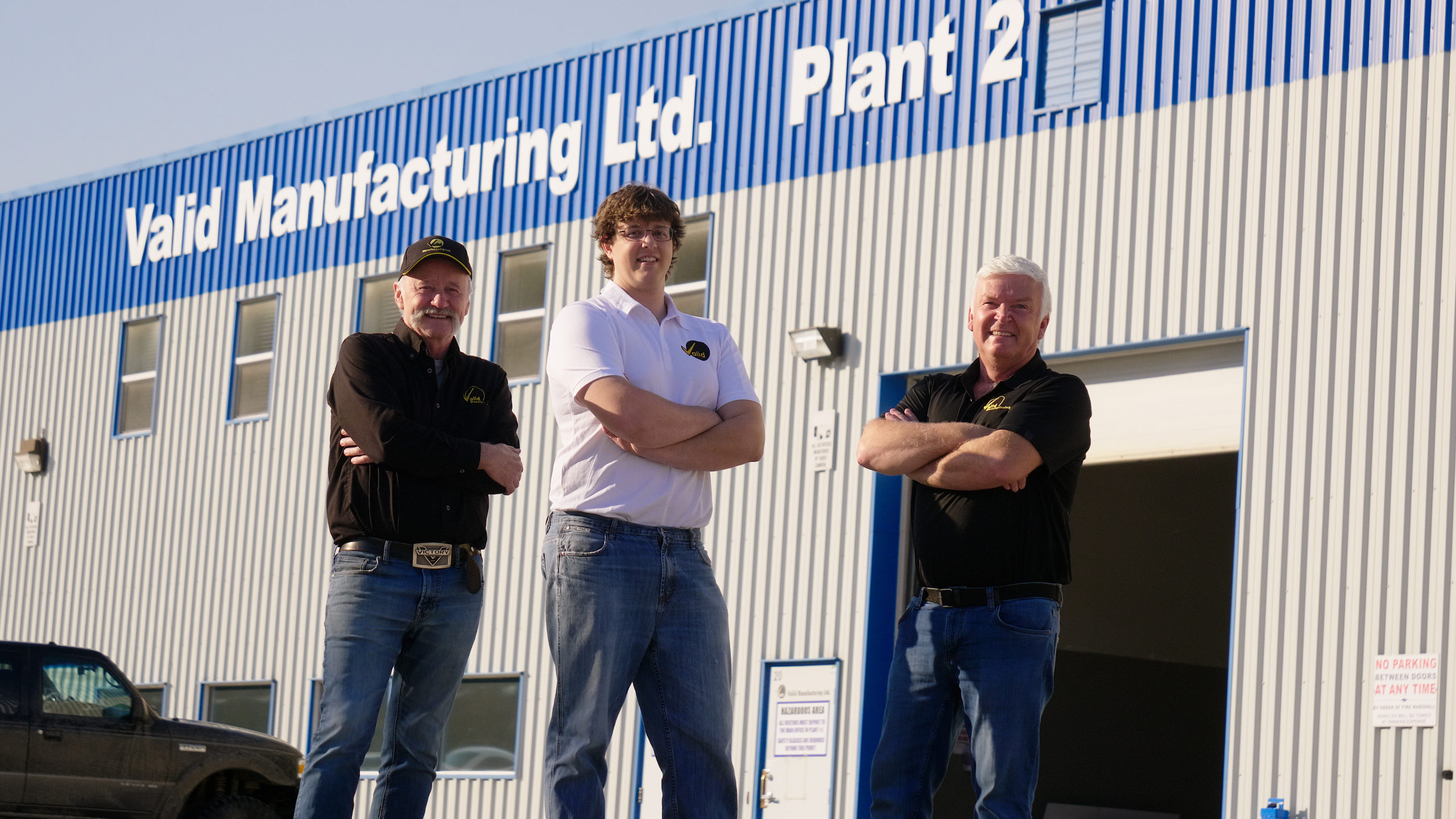Article Published by BC Dairy in BC Holstein News on Valid’s Nutrient Management System.
A BC-made technology is in the business of helping dairy farmers who need to reduce how much phosphorus and other nutrients they are spreading on their forage crop land – while producing a new solid fertilizer that is easily stacked and transported for sale to farmers who are looking for a nutrient-rich fertilizer.
Over the summer, Sunninghill Holsteins, which milks about 100 cows on 300 acres outside of Salmon Arm, trialed a new manure centrifuge created by Valid Manufacturing Ltd, also based in Salmon Arm. The results of three years of research and development, the system uses a pre-treatment to attach most of the phosphorus and some of the nitrogen and potassium in manure to solids in the mix, and then spins the solids out. The result is a liquid with lower levels of nutrients and a dry solid, rich in nutrients that can be easily shipped.
“It was a cool machine. It did well,” says Curtis DeDood, who operates the family Sunninghill farm with his father and other family members. “There were a few bugs they needed to work out of it, especially for the sand.”
Valid’s Project Manager Grant Meikle says one key challenge for the system they had to work out was the ability to handle manure coming out of any barn, regardless of what kind of bedding the farm uses – sand like that used by Sunninghill or larger fiber materials, such as wood chips. Trials like the one at Sunninghill have given them the insights they’ve needed to make adjustments and arrive at a commercial product, which is now available. Another key component that’s just arrived is an associated smartphone and computer app that allows a farmer to monitor the system’s performance in real time.
The genesis of creating this manure management centrifuge started in 2019, when staff at the BC agriculture ministry mentioned to Valid that the dairy industry needed a system to remove nutrients from manure before it was spread on forage – mostly the phosphorus.
“They came to us with the challenge, and said they’d support us in researching a means to do that,” Meikle says. “There is an issue is many places where they’re too much phosphorus, after years of application. There was a need for a mechanical way to extract nutrients from manure prior to application to the land.”
Meikle adds the farmers he’s spoken with want to manage their land responsibly, and not over-fertilize. They also want to make sure they stay ahead of any potential legislation on the issue.
“Most of them realize this is the right thing to do,” he says. “As time goes on and we look at new regulations coming at the industry, a lot are being proactive, trying to get ahead of this. The industry itself is under a lot of pressure right now, and needs all the advantages it can get.”
Valid Manufacturing Ltd. started as an electronics engineering firm 30 years ago, and has since grown into a firm of about 170 employees (50 of them engineers) focused on designing, engineering and manufacturing specialty technologies for a number of industries – electronic digital highway signage, electrical generation, and systems for high-end RVs. And, of course, agriculture. They have a facility with about 100,000 square feet of manufacturing space in Salmon Arm.
After investigating this challenge, the firm did some R&D, came up with their concept, built and started testing a prototype last year. That led to the trial this summer, which also involved a farm in Chilliwack that uses fibre bedding, allowing them to see how the machine functioned with both fibre and sand bedding, and also how it handles the irregular make-up of manure on a dairy farm.
“A lot of the bedding material sloughs in, and gets mixed in with manure,” Meikle says. “The system has to be versatile, able to handle inconsistent feedstock, but produce consistent results. That was the challenge.”
There was a lot to learn in the trials. DeDood says earlier in the trial their sand bedding would plug up the system between the pump and the centrifuge, something Valid spent a lot of time figuring out how to address.
“Valid was really good. We’d see an issue and they’d go to work to fix it right away,” he says. “I expect the bugs will get worked out. They’re right on top of it.”
“It is the right machine if you don’t have enough land to spread your manure on,” he adds. “It’s kind of an all-in-one system, where you don’t need pre-separation, which is pretty impressive.”
The centrifuge works within the farm design, essentially attached to the end of existing reception pits, before storage lagoons. Manure in the reception pit is pulled into a pre-process area, and then is transferred into a tank where it’s kept mixed at a steady consistency before being pumped into the centrifuge itself at a regulated rate, compensating for density and weight of material. The centrifuge spins at 4,250 RPM.
“Once installed, the objective is to make it easy for operator to use. Push the start button and walk away,” Meikle says.
Their base system will handle about 30 – 50 litres a minute, enough for up to about 220 cows. They can build larger systems for larger herds.
A more traditional screw-press separator removes only the largest solids from a manure mix, but allows most suspended solids to carry through to the liquid. A centrifuge, by contrast, removes almost all small solids as well as larger pieces. By running it through a pre-treatment that attaches nutrients to those solids, the resulting liquid has very little phosphorus and lower levels of other nutrients as well.
“If you can remove most of the solids from the stream, you can remove most of the phosphorus,” Meikle says. “The big benefit to the producer is getting phosphorus into a dry matter than can be trucked safely.”
That also creates the side-benefit of reducing the total volume of material going through to storage lagoons by about 25% – the volume of the solids being extracted.
Valid has been working with farmers in the trial to start creating a new market for the solid material, primarily with farms growing berry or other crops without ready access to the nutrients manure readily provides dairy farmers. During the trial, farmers were able to sell the solid product for about $50 a ton, while spreading the liquid on their own fields.
The system has the potential to work with any livestock industry that produces a liquid manure slurry. Valid is already considering applications in hog farming.
The base model currently costs about $280,000 to install, plus ongoing operating and maintenance.

